Page last updated: 29 September 2025
The world’s airports handled record-breaking passenger volumes and cargo shipments in 2024, signalling a recovery of global air travel from the pandemic. This overview ranks major global airports across multiple categories.
Global Aviation Statistics Summary (2024)
- Total global passengers: 9.4 billion (3% above 2019)
- Total cargo tonnage: 127 million tonnes
- Busiest region: Asia-Pacific for passenger growth
- Fastest growing routes: Domestic Asian corridors
- Pandemic Recovery status: Full recovery achieved globally across most regions
Which airport handled the most passengers in 2024?
Hartsfield-Jackson Atlanta International Airport (ATL) maintained its position as the world’s busiest airport, serving 108.1 million passengers in 2024.
- Dubai International (DXB) claimed 2nd place with 92.3 million passengers
- Dallas/Fort Worth (DFW) secured 3rd place with 87.8 million passengers
- Tokyo Haneda (HND) handled 85.7 million passengers in 4th place
- London Heathrow (LHR) ranked 5th with 83.9 million passengers.
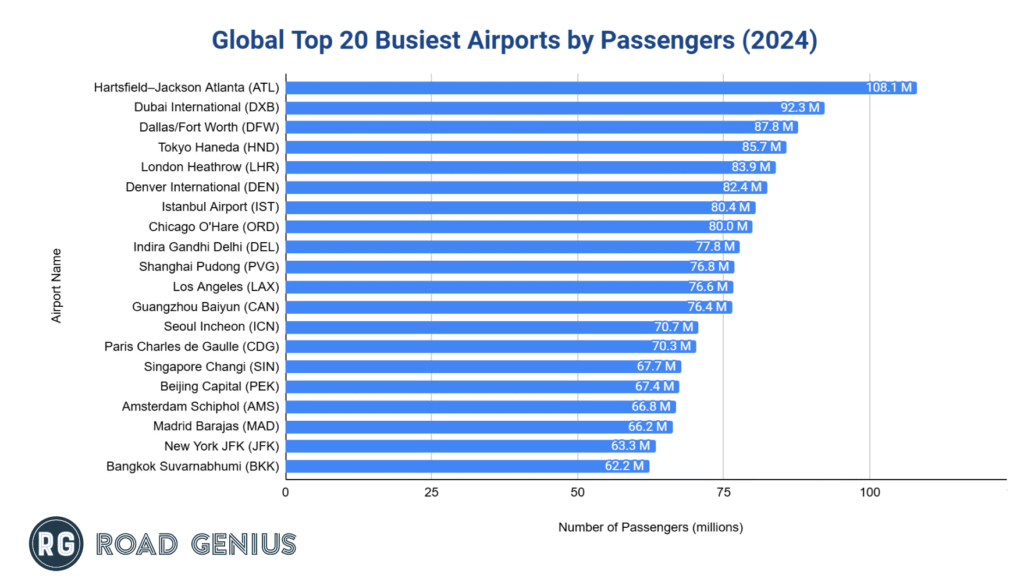
Top 10 Airports in North America (2024)
- Hartsfield–Jackson Atlanta (ATL): 108.1 million passengers
- Dallas/Fort Worth (DFW): 87.8 million passengers
- Denver International (DEN): 82.4 million passengers
- Chicago O’Hare (ORD): 80.0 million passengers
- Los Angeles (LAX): 76.6 million passengers
- New York JFK (JFK): 63.3 million passengers
- Charlotte Douglas (CLT): 58.8 million passengers
- Las Vegas (LAS): 58.5 million passengers
- Orlando (MCO): 57.2 million passengers
- Miami (MIA): 55.9 million passengers
Top 10 Airports in Asia (2024)
- Tokyo Haneda (HND): 85.7 million passengers
- Indira Gandhi Delhi (DEL): 77.8 million passengers
- Shanghai Pudong (PVG): 76.8 million passengers
- Guangzhou Baiyun (CAN): 76.4 million passengers
- Seoul Incheon (ICN): 70.7 million passengers
- Singapore Changi (SIN): 67.7 million passengers
- Beijing Capital (PEK): 67.4 million passengers
- Bangkok Suvarnabhumi (BKK): 62.2 million passengers
- Shenzhen Bao’an (SZX): 61.5 million passengers
- Chengdu Tianfu (TFU): 54.9 million passengers
Top 10 Airports in Europe (2024)
- London Heathrow (LHR): 83.9 million passengers
- Istanbul Airport (IST): 80.4 million passengers
- Paris Charles de Gaulle (CDG): 70.3 million passengers
- Amsterdam Schiphol (AMS): 66.8 million passengers
- Madrid Barajas (MAD): 66.2 million passengers
- Frankfurt (FRA): 61.6 million passengers
- Barcelona El Prat (BCN): 55.0 million passengers
- Rome Fiumicino (FCO): 49.2 million passengers
- London Gatwick (LGW): 43.3 million passengers
- Munich (MUC): 41.6 million passengers
Top 5 Airports in the Middle East (2024)
- Dubai International (DXB): 92.3 million passengers
- Doha Hamad (DOH): 52.7 million passengers
- Jeddah King Abdulaziz (JED): 49.1 million passengers
- Tehran Imam Khomeini (IKA): 15.2 million passengers
- Kuwait International (KWI): 12.8 million passengers
Which airports handle the most flights?
Hartsfield-Jackson Atlanta International Airport (ATL) handled the most flight operations in 2024 at 796,224 total movements.
- Chicago O’Hare (ORD) recorded 776,036 movements
- Dallas/Fort Worth (DFW) took 3rd place with 743,203 aircraft movements.
- Denver International (DEN) processed 694,900 movements
- Las Vegas (LAS) recorded 613,973 aircraft movements.
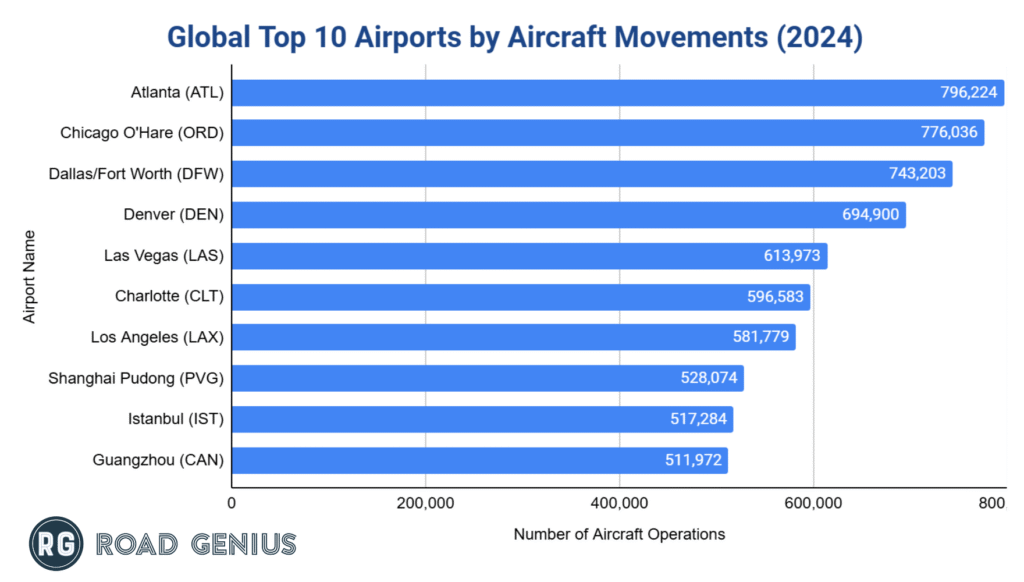
Which airports generate the most revenue?
Paris Charles de Gaulle (CDG) led globally with approximately $6.8 billion in total revenue in 2024.
Top 10 Airports by Revenue (2024)
- Paris Charles de Gaulle (CDG): $6.8 billion
- Frankfurt (FRA): $4.8 billion
- London Heathrow (LHR): $4.5 billion
- Dubai International (DXB): $3.8 billion
- Amsterdam Schiphol (AMS): $2.5 billion
- Singapore Changi (SIN): $2.38 billion
- Hong Kong (HKG): $2.10 billion
- Seoul Incheon (ICN): $2.0 billion
- Los Angeles (LAX): $1.9 billion
- Shanghai Pudong (PVG): $1.7 billion
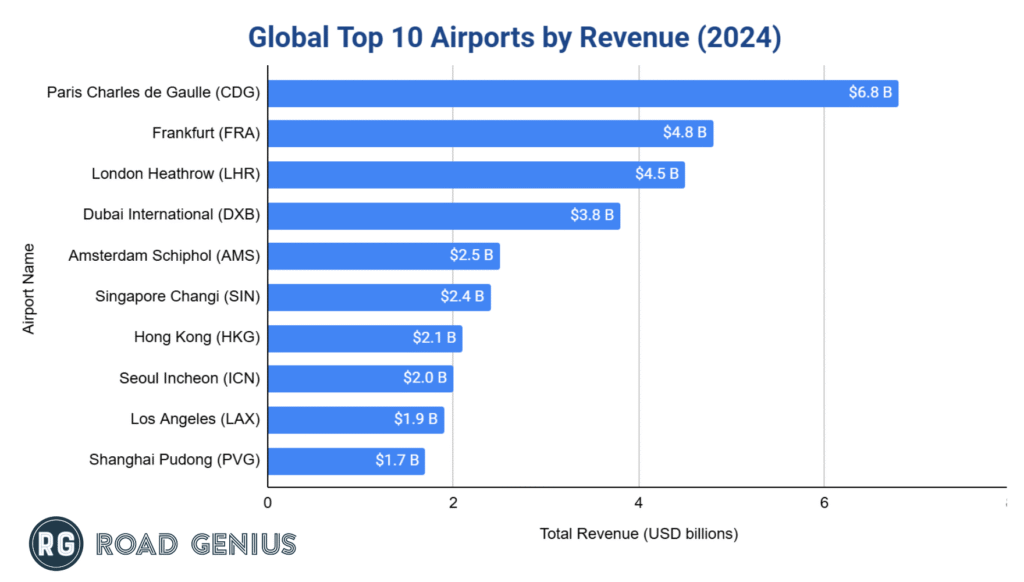
What are the world’s busiest flight routes?
The Jeju to Seoul route in South Korea remained the world’s busiest corridor, carrying 13.2 million passengers in 2024.
| Top 10 Busiest Flight Routes (2024) | |||
| Rank | From | To | Passengers (millions) |
| 1 | Jeju | Seoul (GMP) | 13.2 M |
| 2 | Sapporo (CTS) | Tokyo (HND) | 9.2 M |
| 3 | Fukuoka | Tokyo (HND) | 9.0 M |
| 4 | Hanoi | Ho Chi Minh City | 8.0 M |
| 5 | Melbourne (MEL) | Sydney (SYD) | 7.2 M |
| 6 | Jeddah | Riyadh | 6.3 M |
| 7 | Mumbai | Delhi | 5.9 M |
| 8 | Tokyo (HND) | Okinawa (OKA) | 5.6 M |
| 9 | Shanghai (SHA) | Shenzhen (SZX) | 5.3 M |
| 10 | Beijing (PEK) | Shanghai (SHA) | 5.3 M |
| 11 | Tokyo (HND) | Osaka (ITM) | 5.0 M |
| 12 | Hong Kong (HKG) | Taipei (TPE) | 5.0 M |
| 13 | Guangzhou | Shanghai (SHA) | 5.0 M |
| 14 | Delhi | Bengaluru | 4.8 M |
| 15 | Cairo (CAI) | Jeddah (JED) | 4.4 M |
| 16 | Bengaluru | Mumbai | 4.4 M |
| 17 | Kuala Lumpur (KUL) | Singapore (SIN) | 4.3 M |
| 18 | Seoul (ICN) | Tokyo (NRT) | 4.3 M |
| 19 | New York (JFK) | London (LHR) | 3.2 M |
| 20 | Bangkok (BKK) | Singapore (SIN) | 3.3 M |
Which airports move the most cargo?
Hong Kong International Airport (HKG) maintained its position as the world’s first cargo hub, handling 4.94 million metric tons in 2024.
- Shanghai Pudong secured 2nd place with 3.78 million metric tons
- Memphis processed 3.75 million metric tons
- Anchorage processed 3.70 million metric tons
- Louisville handled 3.15 million metric tons.
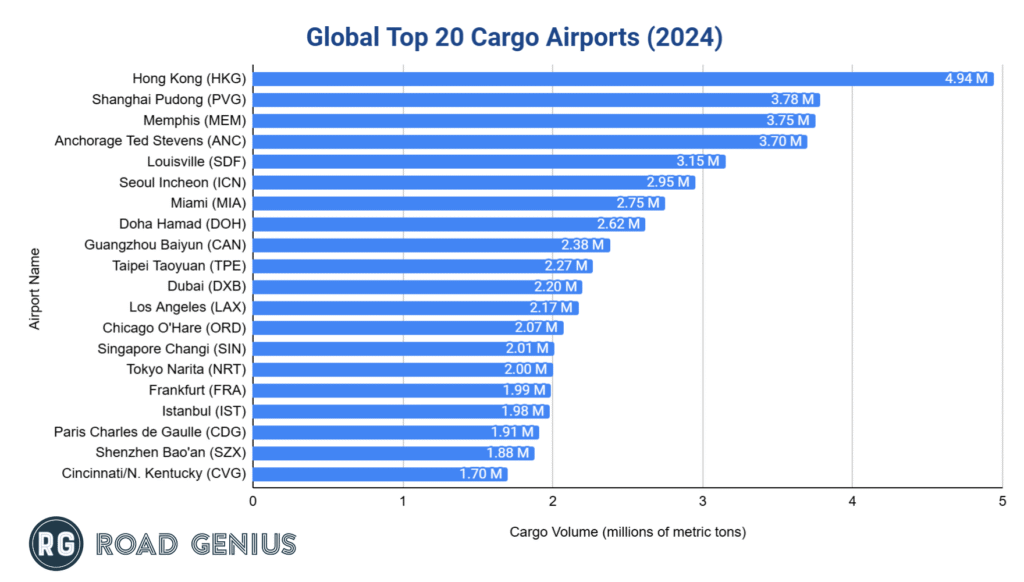
What are the largest airports by area in the world?
King Fahd International Airport (DMM) in Saudi Arabia is the world’s largest airport, spanning 776 square kilometers (299.615 square miles)
- Denver International (DEN) is the second largest at 135.7 square kilometers (52.4 sq miles)
- Dallas/Fort Worth (DFW) uses an area of 69.6 square kilometers (26.9 sq miles)
- Orlando International (MCO) covers 53.8 square kilometers (20.8 square miles)
- Washington Dulles (IAD) occupies 48.6 square kilometers (18.8 square miles).
Which countries have the most airports?
The United States leads the world in global aviation infrastructure. In 2024, there were 5,211 public airports, including over 519 that offer scheduled commercial service.
- China operates 262 commercial airports, followed by India with 148 operational airports, Brazil with 131 commercial facilities, and Mexico rounds out the top five with approximately 100 commercial airports.
Which airports achieve the best on-time performance?
King Khalid International Airport (RUH) in Riyadh achieved the highest global on-time performance with 86.65% departure punctuality and 81.79% arrival reliability.
Top Airports by On-Time Performance (2024)
- Riyadh King Khalid (RUH): 86.65% on-time departures
- Lima Jorge Chavez (LIM): 84.57% on-time departures
- Mexico City Benito Juarez (MEX): 84.04% on-time departures
- Salt Lake City (SLC): on-time 83.80% departures
- Santiago Arturo Merino Benitez (SCL): on-time 82.84% departures
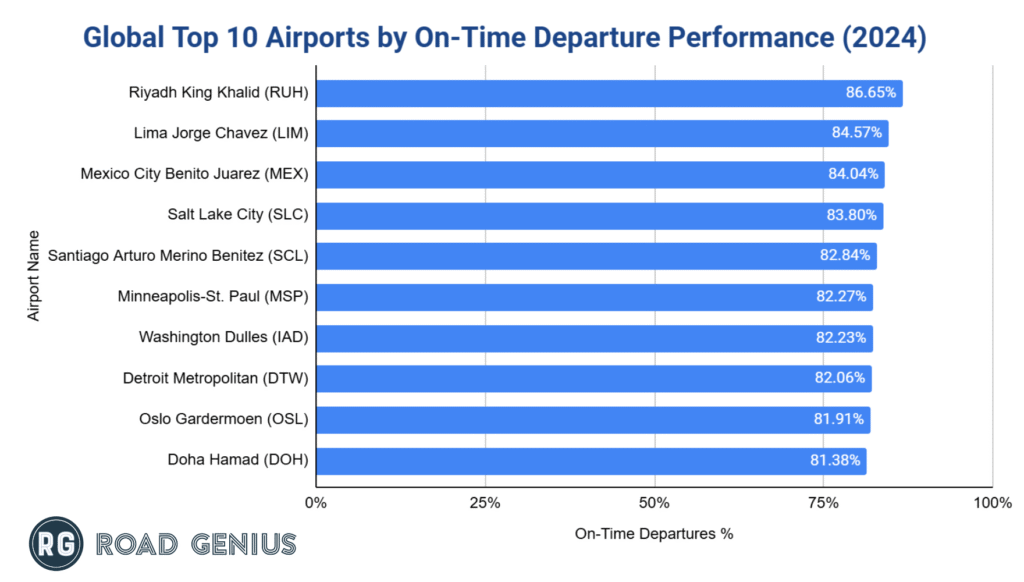
Which Airports Had the Most Safety Incidents in 2024?
Muan International Airport (MWX) in South Korea recorded 179 fatalities from a runway excursion incident.
Top 10 Airports by Safety Incidents (2024)
- Muan International (MWX), South Korea: 1 fatal accident, 179 fatalities
- Cascavel Airport (CAC), Brazil: 1 fatal accident, 62 fatalities
- Aktau Airport (SCO), Kazakhstan: 1 fatal accident, 38 fatalities
- Fort Smith Airport (YSM), Canada: 1 fatal accident, 6 fatalities
- Tokyo Haneda (HND), Japan: 1 fatal accident, 5 fatalities
- Tretyakovo Airport (UUBT), Russia: 1 fatal accident, 3 fatalities
- Fairbanks International (FAI), USA: 1 fatal accident, 2 fatalities
- Naples Airport (APF), USA: 1 accident, 2 fatalities
- Wilson Airport (WIL), Kenya: 1 accident, 2 fatalities
- Vilnius Airport (VNO), Lithuania: 1 fatal accident, 1 fatality
Which Airports Use the Most Advanced Technology?
Singapore Changi (SIN) leads global airport technology innovation with facial recognition e-gates for automated immigration and boarding.
Top 5 Smart Airports by Technology Implementation (2024)
- Singapore Changi (SIN): End-to-end biometrics, AI queue monitoring, 30% faster processing
- Dubai International (DXB): Smart Tunnel biometric immigration, 40% efficiency improvement
- Hong Kong (HKG): AI robotic assistants, facial ID boarding gates, 20% faster boarding
- Amsterdam Schiphol (AMS): AI-driven security screening, passenger flow prediction, 15% reduced wait times
- Beijing Daxing (PKX): Full biometric journey, AI logistics control, designed for 30M passengers
